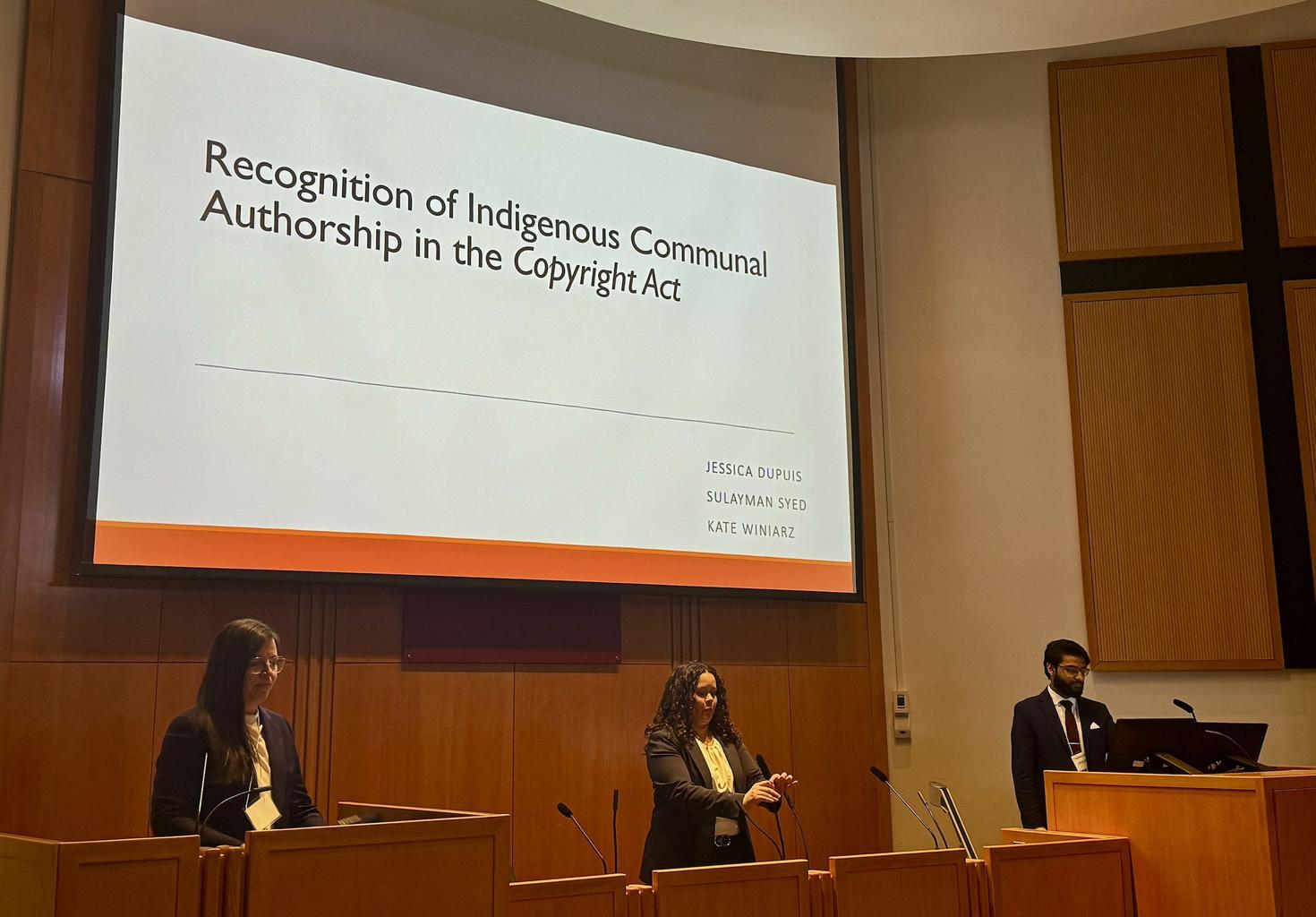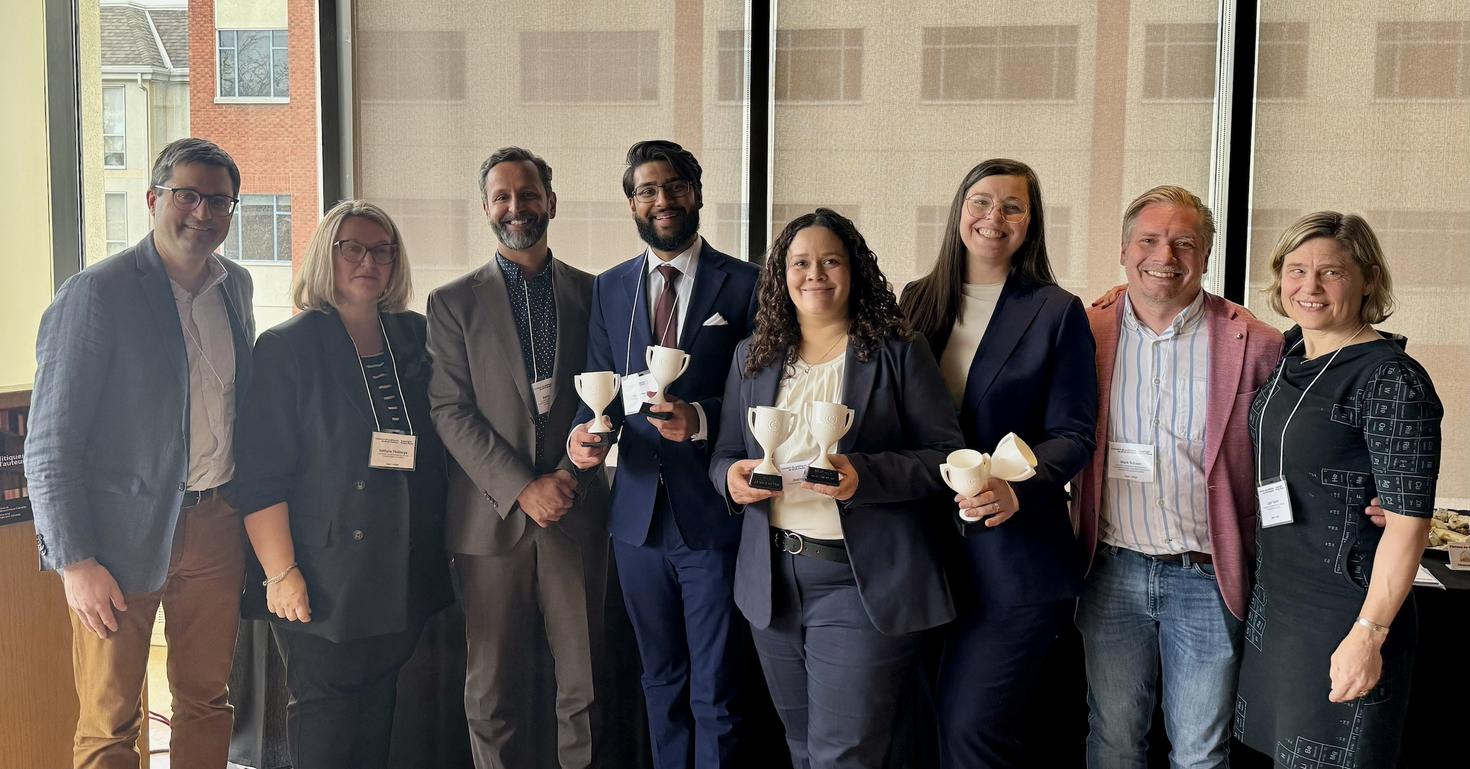The team, comprised of Jessica Dupuis, Sulayman Syed, and Kate Winiarz, is the first in the moot’s history to receive first place honours in both award categories, and rounds out a year of successes for the intellectual property advocacy program offered by the Centre for Law, Technology and Society and the Faculy of Law.
A unique moot, the Canadian Copyright Policy Moot is a copyright policy competition put on jointly by Heritage Canada and Innovation, Science, and Economic Development Canada, in collaboration with the University of Ottawa Centre for Law, Technology, and Society.
Teams of students select their own copyright issues and pitch policy reform proposal directly to policymakers from the federal government. They write and submit a full Memorandum to Cabinet, and then present the proposed policy orally at the briefing competition in Ottawa.
This year, six teams from University of Toronto, McGill University, Université de Montréal, and the University of Ottawa – from the Common Law Section and from the Civil Law Section – defended policy proposals at the oral briefing competition. Teams from the Université de Montréal and McGill University joined the Common Law Section’s team in the final round.
Recognizing Indigenous communal authorship

While students select their own copyright issues, several teams centered their proposal on Indigenous knowledge and the Copyright Act, including the Common Law Section’s team and the runner-up from McGill University.
Building on and enhancing the Faculty of Law’s strengths in Aboriginal Law and Indigenous Legal Traditions, the Common Law Section’s team aimed to advance our individual and collective commitment to reconciliation and the decolonization of legal learning in response to the TRC's calls to action.
The team proposed a system for the recognition of Indigenous communal authorship in the Copyright Act after reviewing the recommendations of Indigenous groups themselves. These recommendations were found in numerous reports, studies, consultations, international comparisons, and other initiatives spanning multiple decades. The team worked together for nearly six months, immersed in the nuances of policymaking, copyright law, and Indigenous legal traditions.
For the team, amending the Act to recognize Indigenous communal authorship presents two opportunities for Indigenous communities: allowing them to benefit economically from, and protect against culturally offensive use of, third party use of works of Indigenous Knowledge. The advent of generative artificial intelligence and text and data mining practices that absorb and reproduce works of Indigenous Knowledge present the impetus for expedient action to provide adequate protection to these works.
Indigenous stakeholders in Canada have formally requested some form of collective rights holding and protection from misappropriation for Indigenous Knowledge since at least 1999, and informally for centuries. The 2019 Statutory Review of the Act recognized that “[i]n Indigenous Communities it is usually a group or society, rather than an individual, who holds the knowledge or expressions. These groups monitor or control the use of these expressions to pass on important knowledge, cultural values, and belief systems to later generations.”
Based on the recommendations of many Indigenous communities, organizations, and individuals in multiple committee studies, reports, and initiatives, the team proposed a framework to ensure works of Indigenous Knowledge enjoy the benefits of copyright. Their Memorandum to Cabinet proposed to deem Indigenous Communities as a new type of author of works of Indigenous Knowledge, and adapts moral rights for Indigenous communal authors to explicitly protect against culturally offensive use of works of Indigenous Knowledge. They also proposed to established a body for the collective administration of the communally owned works of IK. This body determines what constitutes culturally offensive use of Indigenous Knowledge, administers tariffs and royalties, and settles disputes. Their proposal also defines qualified works of Indigenous Knowledge, eligible Indigenous Communities, and culturally offensive use.
In the final round, the team was able to convince a panel of Canada’s leading copyright policymakers: Nathalie Théberge, Vice-Chair and Chief Executive Officer, and Lara Taylor, Secretary General of the Copyright Board of Canada; Owen Ripley, Associate Assistant Deputy Minister, Cultural Affairs at Canadian Heritage ; and Mark Schaan, Senior Assistant Deputy Minister, Strategy and Innovation Policy, and Samir Chhabra, Director General, Marketplace Framework Policy Branch, at Innovation, Science and Economic Development. The expert panel was impressed by their thoughtful research, briefing skills and how they anticipated some of the panel’s most complex questions.
The honourable mentions, for both the Best Memorandum of Cabinet and Best Policy Briefing, went to Julian Guidote and Grace Forster from McGill University with a proposal pushing for the protection of Indigenous knowledge in the Copyright Act using the Act Respecting First Nations, Métis, and Inuit Children Youth and Family as a model.
Both teams were delighted to share ideas on such an important topic and to see a momentum pushing for self-governance and nation-to-nation relationships and underscored the importance of policy action on Indigenous rights.
A successful year for the University of Ottawa
The Centre for Law, Technology and Society is extremely proud to foster an active learning environment and provide such unique experiences to our students!
These accolades further enhance the University of Ottawa’s national and international reputation for mooting excellence in general and in IP law specifically. Indeed, this year, our IP moot teams also took home top honours at the Harold G. Fox Intellectual Property Moot and the Oxford International Intellectual Property Moot.
This is the first time that the IP advocacy program’s teams have all come home winners – winning both domestic and international moots, and the Copyright Policy Moot in a single year.
Such a year of success is due to the University of Ottawa’s world-class training in all dimensions of IP advocacy. Students participating in the Canadian Copyright Policy Moot join colleagues competing in the Oxford International Intellectual Property Moot and the Fox IP Moot together in this pair of boutique courses only taught at uOttawa: written and oral advocacy in intellectual property
The team was coach by Professor Jeremy de Beer and our in-house litigators David Fewer and Christian Clavette from the Samuelson-Glushko Canadian Internet Policy and Public Interest Clinic who could not be more thrilled when the results were announced. David Fewer remarked “We couldn't be happier with the dedication of our mooters and learning outcomes of the process. We are particularly impressed by the teamwork and selflessness this team displayed. Their exceptional support of their mooting colleagues was noted and appreciated.”
In addition, Jessica Dupuis, Sulayman Syed, and Kate Winiarz accessed invaluable mentorship in the production of their Memorandum to Cabinet and preparation to the oral presentation from several people. They were notably supported by professorsChidi Oguamanamand Elizabeth Judge, as well as PhD student Anmol Patel as well as former student Jeremiah Baarbé now at the Copyright Board. Meika Ellis, Rachel Kuchma, Julia Kafato, Ana Nizharade, Scott Robertson, and Ashley Seely, now in private practice, each used their unique skills and experience to provide valuable feedback at every step of the way. The team’s success is directly tied to the generosity of these experts.
The team, known internally as the “Copycats”, displayed team spirit as part of the overall IP mooting program. Whether the Copycats were showing up for an 8 am Fox Moot practice with coffee and breakfast or wishing the Oxford Moot team well with travel goodies, camaraderie was front and centre. The team’s success is directly attributable to the support of both the Oxford and Fox moot teams as they provided feedback, encouragement, and much-needed laughter.
Our warmest congratulations to the team, and all participants to the Copyright Policy Moot!
